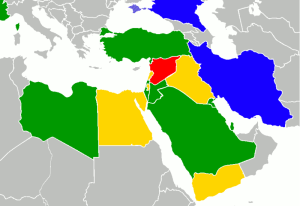Will Saudi Oil Diplomacy Extinguish Syrian Flames?
Since the Arab Spring protests of 2011, Syria has been plagued by a devastating civil war that has cost over 210,000 lives as disparate Sunni militant factions have fought to overthrow the regime of President Bashar al-Assad. The combatants have drawn support from a number of foreign powers, each seeking its own gains. Now Saudi Arabia, one of the central supporters of the Sunni rebels, is using oil to undermine two of Assad’s already strained allies, Russia and Iran.

Global oil prices have decreased by half since this summer. Holding one fifth of global oil reserves, the Kingdom of Saudi Arabia is the most influential player in the Organization of the Petroleum Exporting Countries (OPEC). The Kingdom is wielding its influence to control the price of oil and weaken competition. In November, the Saudis blocked an OPEC proposal to cut oil production and restore the high price of oil. Low oil prices are detrimental to Saudi Arabia’s economy, and its 2015 deficit is projected to reach $39 billion. However, the Kingdom hopes to use its vast savings to maintain low oil prices and cripple Russia and Iran.
Saudi officials are using oil as leverage in ongoing diplomatic talks to pressure Russia, one of Syria’s staunchest allies, to withdraw its support for Assad. Russia is the world’s third-largest oil producer after Saudi Arabia and the US, and petroleum revenues fund 52% of the Russian national budget. Due to low petroleum prices, sanctions over Ukraine, and the plummeting value of ruble, the Russian economy is predicted to shrink by 3% this year. Russia is heavily invested in the Assad regime, and it has used diplomatic maneuvers and arms deals to support the Syrian government. However, Saudi oil diplomacy aims to exploit Russia’s current economic vulnerability in order to hinder its alliance with the Assad regime.
The war in Syria is also enveloped in the rivalry between Saudi Arabia, a Sunni monarchy, and the Islamic Republic of Iran, a Shia theocracy. Iran has forged a close alliance with Assad, a member of the Alawite branch of Shia Islam, and the Islamic Republic has become Assad’s most generous benefactor. Iranian armed forces have assumed direct involvement in the fray, and thousands of additional troops from Hezbollah, a Lebanese Shia militant group funded by Iran, have also joined Assad’s forces. However, like Russia, Iran is in a delicate economic position. Sanctions imposed by the United States for Iran’s controversial nuclear program have halved Iranian oil exports. Facing sharp economic pressure, Iranian President Hassan Rouhani has staked his career on the success of a nuclear agreement with the US. Thus, the Saudi oil policy has been seen as a move to halt Iran’s pursuit of geopolitical dominance. Iran’s economy has diminished by 8.6 percent in the last two years, and the Saudis aim to cripple their beleaguered rival, forcing Iran to withdraw its overextended geopolitical reach.
Doubts remain as to whether Saudi oil diplomacy will succeed in discouraging Assad’s Russian allies. The Saudis already tried to use oil leverage against Russian President Vladimir Putin to no avail in 2013. Although Russia’s economic situation has significantly diminished in the last two years, Putin has demonstrated that Russia’s current policy heeds geopolitical interests over economic concerns. In July, when the US and EU tried to halt Putin’s intervention in Ukraine by bolstering sanctions against Russia, Putin responded by escalating Russia's role in the conflict. Thus, it is doubtful that Putin would fold his hand now in Syria, where he has faced far less opposition from international community.
Iran has also demonstrated that it is likely to continue to pursue its geopolitical ambitions in Syria in spite of economic hardship. Iran is reported to be consolidating Syrian Shia militants to form a new group in the model of Lebanon’s Hezbollah. In addition, on December 7 Rouhani revealed his budget proposal for the coming year. The budget, which provides for a 6% overall increase in government spending, boosts Iran’s military spending by 33.5%. The announcement, meant as an act of defiance in the face of economic pressure, clearly demonstrates that Iran has no plans to bow to economic pressure.
